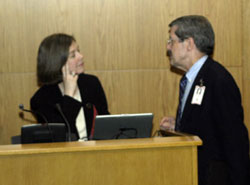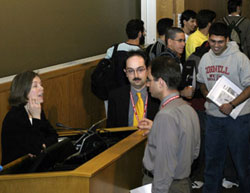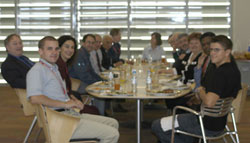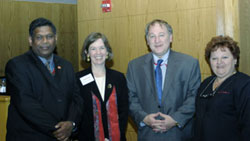Preparing for the MCAT

Dr. Ellen Julian, assistant vice president of
AAMC with Dr. Daniel R.Alonso Dean of WCMC–Q
A vital aid to understanding the Medical College Admission Test (MCAT), the official Website for the test should be required reading for anyone who is considering taking it. This was the advice of Ellen Julian, Ph.D., assistant vice-president of the Association of American Medical Colleges and director of the MCAT.
Dr. Julian was visiting WCMC-Q at the invitation of the Offices of Admissions and Student Affairs. She met with Dean Alonso, faculty, students and staff, delivered a lecture to an invited audience at the Medical College, and visited Qatar Foundation and Qatar University.
Weill Cornell Medical College in Qatar (WCMC-Q) is the only test center for the MCAT in the Gulf region. The MCAT first took place in 1929, and it has undergone a number of major reforms; it is a prerequisite for entry to almost all North American medical schools, including WCMC-Q, which is a branch of Weill Cornell Medical College in New York.
Last summer, WCMC-Q pre-med students, and a number of candidates from outside organizations, took the test. After analyzing the scores, Dr. Julian commented that they have ża lot to be proud of,î particularly since Weill Cornell in Qatar°s students had at the time completed just one year of the Pre-medical Program and had yet to take courses that cover some areas examined in the MCAT, such as organic chemistry.

Dr. Ellen Julian talking to Dr. Marco Ameduri
and Dr. Bogomil Gerganov
The Website contains a mass of information. Among the most important sections you should look at: MCAT Essentials, the Student Manual (with detailed topic content outlines), and practice tests, which could be taken under exam conditions to help you adjust to the tight time constraints of the ´real thing.° These practice tests can also provide useful guidance on the areas you may need to work on, since on-line diagnostic feedback is available.
The purpose of the MCAT is to assist universities in selecting the students who are most likely to succeed in medical school.
However, it is only one part of the admission process. Many other factors are considered, such as research or clinical experience, ża passion for medicine,î references, and performance at interview, said Dr. Julian.
What the MCAT examines
The test has four sections: physical sciences (general chemistry and physics), biological sciences (organic chemistry and biology), verbal reasoning (VR), and a writing sample.

Dr. Ellen Julian with faculty and staff members
Although knowledge of the sciences basic to medicine is required, the aim of the science sections is to probe a student°s ability to apply scientific concepts to solve problems – it is not just what you know, but how you use that knowledge that counts. Questions are based on material taught at the introductory level of undergraduate science courses, and they are written by faculty that are actively involved in teaching the courses.
The VR section assesses a student°s ability to analyze an argument and think beyond what appears in the text. The writing sample takes a similar approach: arguing your case on a particular subject. Recently, the number of questions in the VR section has been reduced, and Dr. Julian reported that this has benefited students for whom English is the second language.
Prepare yourself carefully
Held during one day, the MCAT takes place twice a year, in April and August. It is a long day, and Dr. Julian noted the importance of pacing yourself in order to cope with its demands.

From left to right :Charles Paragg Director
of Student Affairs, Dr. Ellen Julian, Lee Askin
Director of Admissions and Betty Monfort
Director, Office of the Registrar
Careful preparation before taking the test is also important. Among her suggestions:
- use the on-line Student Manual to familiarize yourself with the areas that could be covered in the test
- review the topics listed, with guidance from faculty where needed
- work in groups, and explain a topic you have studied to friends, to find out how well you have grasped it
- to prepare for the VR section, read editorials and essays, examine the writer°s approach, and think about ways to counter the argument; perhaps discuss it with family and friends.
To re-test or not?
Dr. Julian advised against re-taking the test simply to gain better scores, if you have already achieved satisfactory results. The average score for each of the science and VR sections is about 8 (on a scale of 1-15), while for the writing sample it is O, on an alphabetical scale of J to T. The risk with re-testing is that scores – like investments – can go up or down.
The test dates for 2004 are April 17th and August 14th.
